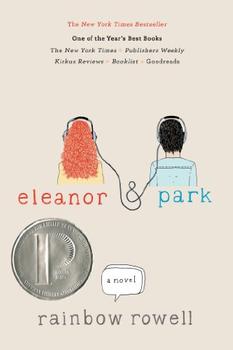Summary | Excerpt | Reading Guide | Reviews | Beyond the book | Read-Alikes | Genres & Themes | Author Bio

Try this creative writing exercise: write about a person or place or situation in as much detail as you can, but without using any description of what that place or person looks like. Nothing at all. Sounds difficult, right? Now imagine writing an entire novel that way, from the point of view of a stubborn, independent, and vulnerable young woman - who also happens to be completely blind. Eric Lindstrom's success at doing just this is one of the many things that makes his debut novel so impressive.
At the center of Lindstrom's novel is high school junior Parker Grant, who lost her sight as a young girl, after a drunk driving accident in which her mother was killed. In the decade since the accident, Parker has grown not only to accept, but in many ways embrace, her disability, wearing jaunty and whimsical scarves around her eyes and fearlessly pursuing her passions (especially running), refusing to recognize many limitations. Her confidence and security are due in large part to her former long-time best friend Scott, as well as her beloved father, who helped Parker find independence even as he was mourning the loss of his wife.
But, soon after they admitted romantic feelings toward each other in the eighth grade, Scott screwed up, blatantly violating Parker's first rule of how to treat a blind person ("Don't deceive me. Ever. Especially using my blindness.") More recently, Parker's dad died suddenly, and Parker's aunt and cousins moved in rather than making Parker move away and learn a whole new city and school. Parker's doing pretty well, though, if you ask her - she hasn't cried in the nearly three months since her dad's death.
Things are on edge at school, though, especially when Parker learns that, thanks to district consolidation, she and Scott will be at the same school for the first time since that horrible middle-school deception that drove a wedge between them. Parker's navigating new friendships, flirting with her first romantic relationship post-Scott, and toying with the idea of joining the track and field team. But as she struggles to find her way through junior year, Parker begins to realize that there are different ways of seeing other people - and that other people may not see her any more clearly than she sees herself.
Debut novelist Lindstrom gives Parker a singular outlook, providing her with a strong, opinionated, sometimes brutally honest voice and never casting her as the helpless victim of her circumstances. Neither is she depicted as unrealistically heroic - she has shortcomings and flaws just like any well-rounded, complicated character. Lindstrom depicts Parker's blindness realistically and offers admirable fictional models for how to relate to friends and acquaintances with disabilities: "from the moment we met you've treated me like a normal person who just needed a bit more information than other people," Parker compliments a new friend. Parker's blindness offers depth and a unique perspective to her story, but it's hardly the whole story; the kinds of self-realizations she comes to are ones that will resonate with all teen readers.
![]() This review was originally published in The BookBrowse Review in January 2016, and has been updated for the
November 2016 edition.
Click here to go to this issue.
This review was originally published in The BookBrowse Review in January 2016, and has been updated for the
November 2016 edition.
Click here to go to this issue.

If you liked Not If I See You First, try these:

by Rainbow Rowell
Published 2020
Set over the course of one school year in 1986, this is the story of two star-crossed misfits - smart enough to know that first love almost never lasts, but brave and desperate enough to try. When Eleanor meets Park, you'll remember your own first love - and just how hard it pulled you under.

by Cammie McGovern
Published 2016
Cammie McGovern follows up her breakout young adult debut, Say What You Will, with this powerful and unforgettable novel about learning from your mistakes, and learning to forgive. Told in alternating points of view, A Step Toward Falling is a poignant, hopeful, and altogether stunning work that will appeal to fans of Jennifer Nevin, Robyn ...
Your guide toexceptional books
BookBrowse seeks out and recommends the best in contemporary fiction and nonfiction—books that not only engage and entertain but also deepen our understanding of ourselves and the world around us.